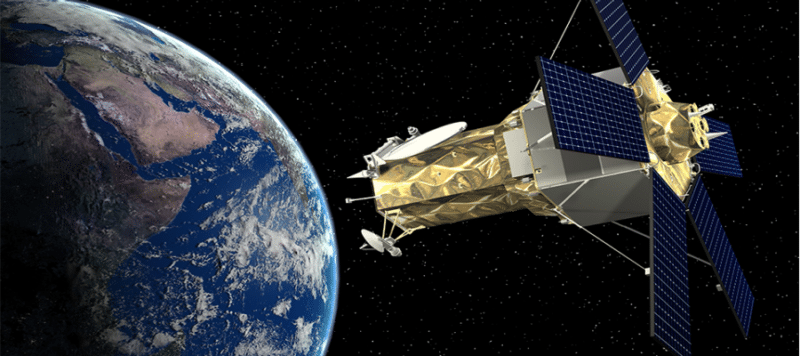Latest News

DigitalGlobe’s WorldView 4 satellite. Photo: Lockheed Martin
It has not been a good start to the year for Maxar Technologies. The company revealed in the last few days that its WorldView-4 satellite (WV4) has likely suffered a significant failure, which means the satellite will not be recoverable. This will lead to significant lost revenue for the company.
As a result, analysts have downgraded their recommendations on the stock. Thanos Moschopoulos, a satellite equity analyst at BMO Capital Markets, said they had now “significantly reduced” their estimates on Maxar. He said in a research note, “We believe that WorldView-4 was slated to drive the majority of the Imaging segment’s growth over the next two years, until the launch of Legion in 2021; as a result, we’ve reduced our Fiscal Year (FY) 2019 revenue forecast by $104 million and our FY2019 Earnings Before Interest, Tax, Depreciation, and Amortization (EBITDA) forecast by $78 million (or by 12 percent, on a U.S. generally accepted accounting principles basis). Our estimates are still based on Canadian GAAP; we anticipate moving to U.S. GAAP following Maxar’s Q4/2018 results.”
Moschopoulossaid that while Maxar is an inexpensive stock, he believes its leverage (and a likely lack of earnings growth until the launch of Legion in FY2021) will continue to weigh on its multiple for the next while. “Further, we believe the satellite failure could potentially affect the company’s longer-term growth prospects and the EBITDA multiples that a potential acquirer might pay for the remaining business,” he added.
WorldView-4 was acquired by GeoEye prior to its merger with DigitalGlobe in 2013. It was launched in November 2016 and generated revenues of approximately $85 million in FY2018. The satellite had a net book value of approximately $155 million, including related assets, as of Dec. 31, 2018. Maxar said it will be able to offset $10 to 15 million of the annual revenue from WorldView-4 and will work to minimize the potential impact on Maxar’s financial results in future years. The WorldView-4 satellite is insured for $183 million, and Maxar intends to seek full recovery for the loss of WorldView-4 under its insurance policies.
Dimitry Khmelnitsky, a satellite equity analyst at Veritas Investment Research, had similar sentiments. Veritas went from a “Buy” recommendation to “Sell” in about two weeks. “Maxar will lose approximately $75 million in annual revenue, which according to our estimates, translates into a loss of about $45 million in adjusted EBITDA (net of offsets from other satellites). In addition, we believe that the failure of WorldView-4 severely reduces Maxar’s future growth prospects in the company’s core and most profitable Imagery segment that was supposed to be a key growth engine,” he said in a research note.
Khmelnitsky believes the company is heading into an uncertain time. “However, Maxar’s liquidity situation will worsen as the loss of WV4 reduces our estimate of Maxar’s cash-based 2019 EBITDA (adjusted to eliminate non-cash revenue) by 9 percent. The continued uncertainty related to the disposal of money losing Geostationary Orbit (GEO) segment, coupled with the loss of $45 million in cash flow materially increases the need for Maxar to tap its unutilized credit facility, which will further increase debt load. Although management expects to recover approximately $180 million in insurance proceeds within the next 12 months, as well as take steps to further reduce costs and maximize revenue from other business verticals (Radarsat and cloud-based Imagery products), these remain to be seen,” he added.
Steven Li, a satellite research analyst at Raymond James, added in another research note, “We assume much of the near-term growth at its Imagery segment (at least until Legion launches in 2021) was tied to WorldView-4. As a result of our analysis, we assume Maxar not only loses the WorldView-4 annual revenue to date but also loses the EBITDA growth that was expected in 2019 and 2020.”
In other news, Maxar announced today that SSL, a Maxar company, has won a contract to define requirements for a small form-factor satellite that will monitor and measure methane emissions from oil and gas facilities around the world. The satellite, called MethaneSat, will enable Environment Defense Fund (EDF) to change the way we detect and analyze methane emissions and understand and combat climate change. Following design development, EDF anticipates awarding a contract in 2019 for the final design and manufacturing of the satellite. MethaneSat will provide global, high-resolution detection of methane emissions from regions that account for over 80 percent of global oil and gas production on a weekly basis. The satellite’s high precision will enable it to detect and quantify both high- and low-emission sources and accurately attribute them to relevant oil and gas infrastructure.
Get the latest Via Satellite news!
Subscribe Now